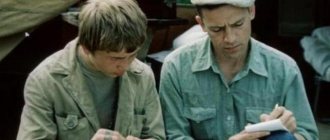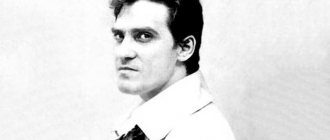Biography
Egor was born into a creative family. His father is the famous actor Valery Barinov, and his mother Tatyana is a director. They met at the Alexandrinsky Theater, fell in love, got married, but the marriage was short-lived. After their divorce, little Yegor remained with his father.
“The very thought that mom and dad would live separately was terrible for me. It was a disaster! But I’m one of those kids who “understands everything.” The fact that I would stay with my dad was not a surprise to me. The mother had serious health problems at that time. Mom understood her problem, knew that she couldn’t raise me alone, and decided not to take on such responsibility,” the artist recalls.
The father raised his son in strictness, taught him to act from childhood, and wanted the boy to follow in his footsteps. Egor says: “He (Valery Barinov) is a powerful and domineering man. Whatever I decided or did was always considered correct, and my opinion was usually not taken into account... Since childhood, my dad has been the smartest and strongest for me. In a sense, he crushed me with his authority...
There was a certain severity. But it didn’t arise out of nowhere, the current situation contributed to it - after all, he stayed with me, you must admit, for a man this is a huge burden and responsibility. But the atmosphere in my father's house was good. His friends often came to us. His friend, the artist Uncle Borya Pavlov, brought a guitar, everyone sang, and his father sang wonderfully, and everything was somehow very beautiful...
My mother participated in my upbringing as much as she could - I came to her, we went to museums and art exhibitions together. We often went to St. Petersburg to visit my grandmother, Claudia Alexandrovna.”
The future actor’s childhood years were spent not only behind the scenes of the theater, but also on stage: “Everything was like adults: roles, words, monologues. As a child, I didn’t have leading roles. During his school years he was involved in four performances: “Rumour”, “Private Persons”, “Law of Eternity” and “Anomalies”. At the age of 14, he went on tour to Germany for the first time. I then starred in a youth play about neo-fascists - I played a villain who at the end of the play kills the hero.”
It is not surprising that after school the young man had no doubt where to go. Egor Barinov submitted documents to the Shchepkinsky Theater School, passed the qualifying rounds and became a student at a prestigious university.
The beginning of creative activity
After graduating from secondary school, Yegor Barinov entered the Shchepkinsky School and in 1996 became a professional actor. While still studying, he acted in films, and his work was celebrated at the Yakhontov competition. For two years, the young actor Yegor Barinov worked at the theater. Pushkin, tried to play on the stage of A. Dzhigarkhanyan’s theater. He took part in the productions of “The Three Musketeers”, “The Adventures of Dunno”, and “Treasure Island”. Later, Yegor Barinov fulfilled his old dream - to appear on the stage of the Maly Theater. Here he played in the plays “The Deep”, “The Cardinal’s Cloak”, “Chronicle of a Palace Coup”. In 2004, Yegor finally left the theater. He decided to try his hand at film and television.
Theater
In 1996, the young man graduated from Shchepka (Viktor Korshunov’s course) and got a job at the Pushkin Theater. There he served for two years, after which he moved to the Armen Dzhigarkhanyan Theater. In 2000, his father’s dream came true - Barinov Jr. appeared on the stage of the Maly Theater. Recently, the artist has been working in independent projects.
THEATER WORKS
Theater named after Pushkin:
- Black Dog - R. Stevenson “Treasure Island” (dir. E. Pisarev, D. Filimonov);
- Arkhip - A.S. Pushkin “Dubrovsky” (dir. R. Markholiya);
- A policeman in love - "The Soup" (dir. N. Arakcheeva).
Theater directed by A. Dzhigarkhanyan:
- Bobchinsky-Dobchinsky - N.V. Gogol “The Inspector General” (dir. S. Gazarov).
Cool theater:
- Znayka - N. Nosov “The Adventures of Dunno” (dir. A. Girba);
- Captain Smolet - R. Stevenson “Treasure Island” (dir. E. Pisarev, D. Filimonov);
- Third Jacques - “Quartet for Laura” (dir. A. Zhitinkin);
- Pravdin - D. Fonvizin “Undergrown” (dir. A. Girba);
- Rochefort - A. Dumas “The Three Musketeers” (dir. V. Krasovsky).
Maly Theater:
- Pogulyaev - A.N. Ostrovsky “The Deep” (dir. A. Korshunov);
- Grigory Orlov - “Chronicle of a Palace Coup” (dir. V. Beilis);
- De Thou - “The Cardinal’s Cloak” (dir. V. Dragunov).
Entreprise:
- Tolyan - “Ladybirds” (2005, directed by A. Girba).
Difficult period
Alexander Barinov is an actor who almost never remained without roles. He starred in many action films and thrillers, mostly embodying the images of strong and courageous heroes. Such images are ideal for a Russian film star, taking into account his athletic training. Alexander knows martial arts, does acrobatics and is a good fencer. Of course, he also got the roles of romantic lovers.
“Thank God, not in America...”, “Scientific section of pilots”, “Reflection”, “Love to the grave”, “Hatch” - these are just a few of the films in which he managed to star in over the years of work. However, Alexander was not always able to feel like the darling of fate. There was even a moment when the actor felt that he was on the edge of an abyss, which was associated with an excessive passion for alcoholic beverages.
The moment came when the star was even offered to resign from the Moscow Pushkin Theater. It is possible that this is what prompted Barinov to give up alcohol. The actor assures that he didn’t even have to use coding to quit his dangerous addiction, he just mustered all his will into a fist and hasn’t drunk since then.
Cinema
Yegor Barinov first appeared in films at the age of five. It was the film “The Cherry Whirlpool” directed by Leonid Golovny. The actor recalls how he got to the set: “My father brought me to the set. There were several children's roles in the film, they tried me for everything, but they approved me for the role of the grandson of the hero played by my father. We shot 11 episodes worth of material. And since only two needed to be released, they cut me a lot. In the end, there was only one episode left where I sit and eat peas next to my father.”
In 1990, the actor starred in two dramatic films “Nautilus” and “Victim”.
Then Yegor appeared in an episode of the historical series “St. Petersburg Mysteries,” in which his father Valery Barinov played one of the key roles. Subsequently, they quite often starred in joint projects: “Agape”, “Kadetstvo”, “Men’s Work”, “Chain”, “Rope of Sand”, “Nine Unknowns”, “The Last Chord”, “Male Female Game”.
The artist considers one of his best works to be the role of Baldy in the melodrama directed by Valery Rubinchik “Nanjing Landscape”: “I played a bald criminal with a fixative and a scar. Despite the fact that he kills the main character, he still evokes compassion due to his fate and restlessness. This experiment turned out to be interesting - there was a transformation into a completely different person.”
The series in which Yegor Barinov played police officers enjoyed great success among viewers. In particular, in the film “Precinct” he appeared as investigator Andrei Bocharnikov. And in the crime drama “Comrades Policemen” he played the role of senior detective of the homicide department Gennady Vlasov.
The actor has worked in such popular films as: “Carmelita”, “Turkish March”, “Sweepstakes”, “Mad”, “District Detectives”, “Daddy’s Daughters”, “Maryina Roshcha”, “Two Sisters”, “ Margosha”, “Fizruk”, “Alexandrovsky Garden”, “Volkov’s Hour”, “Efrosinya”, “Russian Character”, “The Other Shore”, “Love in a Million”, “1943”, “Fatal Inheritance”, “Live and Remember” "and many others.
Most often, Yegor is invited to play negative characters. This stereotype was broken in the film “The Weaknesses of a Strong Woman” thanks to the role of Mitya.
Fans often compare Yegor Barinov with the legendary Quentin Tarantino. The artist even played him in the comedy “Take Tarantine.”
"Thresholds"
And in one of the latest series “Thresholds” directed by Yusup Razykov, he got the role of criminal Korney Istratov. The film tells the story of two friends - Andrei Ganzhi (Nikita Tezin) and Dmitry Volkov (Mikhail Gavrilov), who come to the border town of Sosny to serve. Andrey is not new to these places. He was taken from an orphanage to the family of Colonel Reutov (Sergei Yushkevich), an employee in Sosny, and his wife Daria (Larisa Shakhovorostova). Andrey shares a childhood love with their own daughter Polina (Maria Bolonkina) - and the guy hopes for a quick wedding. But Polina’s feelings turn out to be only friendly. And soon the girl completely understands that her heart is drawn to Andrei’s friend, Dmitry...
The film also starred: Pyotr Barancheev, Elena An, Kirill Grebenshchikov.
Currently, the actor’s filmography includes about 150 film works.
Movies
As mentioned earlier, Egor Barinov first starred at the age of five in the film “The Cherry Pool.” 10 years later he appeared in the film Nautilus.
After a six-year break, Barinov participated in the filming of the film “Agate”. An interesting fact is that his father also starred in this film together with Yegor. Then he appeared in various films, playing minor characters.
Soon Egor Barinov starred in such famous television series as “Kadetstvo”, “Daddy’s Daughters”, “Margosha” and “Turkish March”.
Barinov calls the film “Nanjing Landscape” one of his most successful works in cinema.
In it he masterfully played a cold-blooded killer. The film was appreciated by film critics and received several awards.
It is interesting that by nature Egor is a calm and reasonable person. However, most often he is offered to play negative characters.
According to the directors, his tall stature, cold gaze and wide cheekbones are perfect for anti-heroes.
Then Yegor Barinov played the main roles in such films as “Love in a Million”, “The Other Shore” and “Russian Character”. To date, his creative biography includes more than 150 films and television series.
In 2006, Egor played the role of Quentin Tarantino in the modern comedy Take Tarantino. The film's director, Roman Kachanov, noticed Barinov's obvious resemblance to the famous Hollywood film director.
As a result, Barinov managed to perfectly convey the image of his hero. An interesting fact is that Bogdan Stupka and Lyudmila Gurchenko took part in this mini-series.
In 2011, Egor Barinov graduated from directors' courses. As his thesis, he presented a short film, “Strike,” shot without words.
Four years later, his film was awarded the main prize at the Independent Film Festival. In 2014, the actor appeared in the youth television series “Fizruk” in the role of Ronin.
Directing
In 2011, Egor graduated from the Higher Courses for Scriptwriters and Directors. He defended his diploma with his short film “Impact”, about which he says: “I wanted, first of all, to tell a story without words. This was my task. And our teachers at the courses advised so. If you want to understand cinema, the language of cinema, make a story without words. Almost all the tasks that were given during the training process were used in the tape.
In fact, this is a story about the problems of middle-aged people. People have been married for some time, even if there are children, some kind of fatigue from each other still accumulates. And I would say that these are my feelings from my age.
And also, this is my inner fear of a woman. Men usually don’t admit it, but they fear precisely women’s unpredictability. The two sexes are completely unable to fully understand each other. They cannot understand the nature of the other sex. Even if you have a family with him, children, it is still not clear what motivates him. And not just because it is another person, a man can understand a man, namely the opposition of the sexes in marriage, as they say. And it seems to me that in this intuitive way I revealed this topic a little. The story turned out to be tragicomic, just like all of life...
In the film, made in the genre of tragicomedy, I wanted to convey the idea that society is overloaded with aggression - it comes from everywhere, is intensified, and people often do not notice it, and it comes out in completely unexpected ways. And about women's dissatisfaction in an aggressive world. Using the example of one day in the life of a woman. Of course, I filmed my wife, since we came up with the film together. And I am pleased that at the Independent Film Festival in St. Petersburg in 2020, I was given the main prize for this film.”
When asked why the actor took directing courses, he answers: “It always seemed to me that I had directorial abilities. Based on the various works that I had done before and shown to people, they told me that I was doing well, that I had my own vision, I had taste. I have the ability to tell a story with an image. During the course I corrected many of my mistakes in understanding cinema. It would seem that I have been on the set since childhood, but when you are on one side of the camera, it feels completely different. I am very grateful to the courses for the opportunity to get inside the cinema. Artists always have the feeling that they’re inviting you to the cinema, but they don’t let you go far. It seems like you are in a movie, but there is a constant suspicion that something is not being explained to you. Like doctors with patients, they don’t explain what’s happening to you, and it’s the same here.”
First roles
Few people know that the talented actor played his first film role while still studying at GITIS. He starred in an episode of the musical comedy “Matchmaking of a Hussar,” the plot of which was borrowed from the vaudeville “Petersburg Moneylender.” Then Mikhail Boyarsky and Elena Koreneva became his colleagues on the set. Of course, his episodic participation in filming did not bring him fame, but Alexander gained useful experience.
Alexander Barinov was able to attract the attention of viewers and directors thanks to the drama “Paid for Everything,” filmed by Alexei Saltykov. The film tells about the events taking place during the war in Afghanistan. The young actor played Bosun, one of the central characters. His character was loved by the audience, and the role became a kind of calling card for Barinov.
Participation in the filming of the crime melodrama “Katala” helped Alexander consolidate his success. This film by Sergei Bodrov tells the story of a successful gambler who infiltrates the environment of professional gamblers in the hope of winning big. The audience liked the films “Under the Circus Dome” and “Sergei Sergeevich”, in which Barinov also played. It is interesting that in the film “Under the Circus Big Top” he starred as a woman. Later, the actor recalled with a laugh that the entire crowd tried to explain to him how the fair sex should move.
Personal life
Egor Barinov was married twice. They lived with their first wife, actress Elena Novikova, for only two years. During the divorce process, Elena found out that she was pregnant, but the news did not influence the decision to separate. The actor’s son Danila was raised by his stepfather.
“Now my ex-wife and I communicate well, we collaborate - she is not only an actress, but also a director, plus she produces some projects, periodically invites me to them as an actor. Lena is a wonderful person, and I am very glad that we managed to maintain friendly relations. It couldn’t be otherwise, we didn’t do anything bad to each other. It just turned out that they didn’t match in their life together, they couldn’t get along together. Because of everyday life. Nothing new, this often happens in families, it’s not for nothing that they say: the love boat crashed into everyday life,” notes Egor.
The artist met his second wife Ksenia Mishina at the Maly Theater. The girl at that time studied at the Shchepkinsky School and worked part-time in a theater crowd. It was a romance with passions. The couple dated and broke up. Eventually they got married. Now they already have three daughters: Polina, Nastya and Masha.
Barinov says: “A year after our honeymoon, our first daughter was born. My wife then worked at the Theater on Pokrovka, from where she went on maternity leave. Then Nastya was born... And when Ksyukha was about to return to the stage again, Masha suddenly appeared. So now the wife has something to do at home. And it seems to me that she is happy with this coincidence of circumstances. ...Still, they love me, and this warms my soul. But there is one difficulty: they are all difficult girls with character, even this little one. I'm the only simple one in the family (smiles). They are also very active, nimble...
But as for the profession, to be honest, I don’t know. Girls, of course, have a harder time in our business, if only because there are more male roles. I would probably prefer a different story for my daughters. One thing I know for sure: I will try to honestly tell them about all the problems associated with the lives of artists, to bring to their understanding all the disadvantages.”
Childhood and youth
Egor Valerievich Barinov was born on September 9, 1975 in Moscow. He grew up in a creative and educated family. His father, Valery Alexandrovich, is an active film actor. In 1999 he was awarded the title of People's Artist of the Russian Federation. Yegor's mother is a director.
Barinov's parents divorced when he was still a child. As a result, the boy remained to live with his father, but often saw his mother.
Barinov Sr. was a very capricious and firm person. From early childhood, he taught his son discipline and instilled in him a love of theatrical art.
When Yegor Barinov was barely 5 years old, he made his first debut in cinema. After this, the boy wanted to become a famous artist, following in his father's footsteps. After graduating from school, he successfully passed the exams at the Shchepkinsky Theater School and plunged headlong into the world of art.
After graduating from college in 1996, Barinov became an actor at the A. S. Pushkin Theater, where he worked for about two years. After that, he worked for a year at the Armen Dzhigarkhanyan Theater.
In 2000, Yegor first appeared on the stage of the Maly Theater, but after a few years he realized that he wanted to become a film actor.
Interview
About the profession:
“For me, the most important thing is the minutes when it works out! Did something that you don't think others can do. When you feel that you were specially created by someone to play this. I had several such moments when you do something, go and think: yes, today you jumped above reality. They are very short, these moments, but for them it is worth coming to this profession.”
“In general, it seems to me that a crisis is not a crisis, we need to do something, no matter what. Live! The acting profession, if it needs you, it will find you. Of course, there are breaks in work, but during this time I work on something else related to the profession.”
“If I didn’t have a penchant for acting, I think my father simply wouldn’t have let me into the profession. After all, when you go on stage, into the frame, you can immediately see whether you are empty or not, whether you can play or whether it is not given to you, not inherent in nature. And if so, but the person still tries to play, it’s a disaster. Those around him understand everything, but he feels his own inadequacy, and the experiences are very painful. It’s better to immediately think and figure out: perhaps, in order to be successful, it’s worth looking for other talents in yourself. I always had to prove that I was not taking someone else’s place. I hope it worked. Of course, a well-known surname is a huge plus, sort of like a bonus given from the very beginning. But this “brand” needs to be consistent.”
About the roles:
“In my opinion, from an acting point of view, a negative character is more interesting. It is interesting, as they say, to dissect the nature of evil, to get to the bottom of it, to figure out where cruelty, hatred, and meanness come from in a person. In addition, a vicious nature is often hidden behind external charm, and most thieves, swindlers and insidious people in general are charming, charismatic and attractive. At the same time, they are free and independent...”
“My father also played negative characters for a long time. It's all about facial features, appearance. This plays a huge role in such a genre of art as cinema. Here, to a lesser extent than in the theater, the artist himself and his acting are important. The emphasis is on appearance. The cameraman of the film “Nanjing Landscape” once told me: “When you talk to you, you have an open look, but as soon as the camera aligns with your eyes and you look from under your brows, an unpleasant feeling appears.” And directors began to use this and invite them to play villain roles.”
“I would like to play the role in which the director sees me. Having been in the director's chair, I was convinced that the only right choice was his: who and what should play in his project. An artist can want to play as much as he wants and whoever he wants. I used to not quite understand a certain remark that we were told at school, that an artist only needs to play three roles that he wants to play in order for him to end up as an artist. And now I understand. It is important what the director sees you in. If he sees you in this material, sees and accepts your individuality, then he invites you to play his role. And I would like to be seen and invited to a specific role that suits me. And it would be just great if both the material and the director were good.”
About the theater:
“The whole point is that I associate the theater, the “big” one, with an enterprise in which a product needs to be released. And often, in the “big” theater, sometimes there are not so many opportunities for creativity, in my opinion. There are exceptions, there are good performances. But, here, as elsewhere, you need to be lucky, and you find yourself in the right company, declare yourself, so that you can choose material for further work. I want to play this, but I don’t want to play this. It’s one thing, you’re playing some good performance with a good director, and another thing, you’re playing for the theater box office.”
About criticism:
“I have a different attitude. When it's a movie, you can see for yourself how bad, good, right or wrong it is. As for the theater, it is, of course, more complicated. I listen to criticism, especially if it is constructive, if a person wants to not just tell you that this is bad, but suggest something, advise you. Rather, on the contrary, I feel uneasy when someone simply praises, then I feel distrustful. I myself often express my opinion, although not everyone likes to accept criticism.”
About Me:
“I take every opportunity to shoot...”
"I prefer to play for myself..."
“...sharp facial features, deep-set eyes - people and directors fall for it.”
“Everyone used to say that I was a copy of my father, but only until Tarantino appeared on our screens. Now they usually ask: “Do you know who you look like?” I answer: “I know - on Tarantino.” I'm not proud of it, but I don't feel any unpleasant emotions either. Just funny. Well, it looks like what to do...”
About the crisis:
“I was once, at the age of 28, and very serious. I then decided to quit acting altogether. I began a period of internal discord, a feeling of my own inadequacy as an artist. From episodic, identical roles in TV series, I felt clichéd, worthless, there was practically no theatrical work. That is, there were theaters, but... I worked for two years at Pushkinsky, a season at Dzhigarkhanyan, five seasons at Maly, then participated in various independent projects, but there were no abundance of performances with my participation, practically the same serious roles, I rarely appeared in front of the audience , from time to time, with long breaks. And I painfully searched for myself in the profession. And I wanted to earn money, and not be a poor artist, scouring for part-time work... In general, I decided to try to get away from my unfortunate professional dependence, and went to study directing.”
About acting marriages:
“There are both pros and cons. There is an understanding of the profession that your significant other is engaged in, on the other hand, of course, there is some competition, and you can’t escape it. We have to put up with all this, try to talk, come to some acceptable solutions for both.”
Based on materials from Wikipedia and websites: kino-teatr.ru, bestactor.ru, lifeactor.ru, peoples.ru, 24smi.org, fb.ru, tele.ru, uznayvse.ru, stuki-druki.com, journal-gorproekt. ru, 7lafa.com, ampravda.ru.
Roles and most successful works
Alexander Barinov is not an actor of one role. Over almost three decades of his creative activity in theater and cinema, he played both comedic characters and people with a tragic fate. In the film "Under the Big Top" he even had to portray a clown dressed as a woman. Moreover, according to the testimony of the audience, he coped with this difficult task perfectly.
As already mentioned, Alexander Barinov managed to overcome alcohol addiction and return to his favorite job. Fortunately, directors and producers believed that his problems were already in the past, and began to actively invite the actor to enterprises.
Some roles brought Alexander Barinov recognition from critics and colleagues. In particular, the images he created on stage of the Apostle Peter (“Poor Judas”), Treplev (“The Seagull”), Gorodnichy (“The Inspector General”) and Famusov in the production of Griboyedov’s play “Woe from Wit” were highly appreciated.
As for the audience, they consider Alexander Barinov’s best work to be his participation in the television series “Gold of Ugra,” where he played one of the key roles. For her performance, the actor was nominated for the Golden Aries award and the main prize of the Shock film festival.
In addition, in 1999, Barinov was nominated as a candidate for an award at the Pushkin Festival for the role of the Author in the play at the Theater. A. Pushkin’s “The Captain’s Daughter”, and in 2004 he was awarded the title of Honored Artist of Russia.
At the moment, the actor can be seen both in the role of a weak-willed drunkard and Emperor Nicholas the First. Moreover, in any of them he looks quite convincing and, judging by the reviews, pleases his loyal fans.
Filmography: Actor
- The one who reads minds (2017), TV series
- Bad Daughter (2017)
- Optimists (2017), TV series
- Fugitive (2017)
- Metro Police Captain (2016)
- Faith (2016)
- Russian character (2015), TV series
- Thresholds (2015), TV series
- Fizruk (2014), TV series
- A start to life (2014)
- On the Razor's Edge (2014), TV series
- Sky of Fallen (2014)
- Maryina Roshcha-2 (2014), TV series
- Karpov. Season three (2014), TV series
- The Other Shore (2014)
- Fatal Inheritance (2014), TV series
- Craftsmen (2013)
- Stompers (2013)
- Yasmin (2013), TV series
- Black cats (2013), TV series
- Silent Hunt (2013), TV series
- Not a simple story at all (2013)
- Operation Puppeteer (2013), TV series
- Night Swallows (2013)
- Sky of Fallen (2013)
- Lyudmila (2013)
- Love in a Million (2013), TV series
- Coma (2013), TV series
- Delta (2013), TV series
- 1943 (2013)
- Thunder (2012), TV series
- Maryina Roshcha (2012), TV series
- Road to Easter Island (2012), TV series
- Faith. Hope. Destiny (2012)
- Alibi hope, alibi love (2012)
- Euphrosyne. Taiga love (2011-2012), TV series
- Fellow Police Officers (2011), TV series
- Euphrosyne. Sequel (2011), TV series
- Last chord (2011)
- Protected Persons (2011)
- Men's Women's Game (2011)
- Sea Devils-5 (2011)
- Mologa. Russian Atlantis (2011)
- Forester (2011), TV series
- Keys to happiness. Sequel (2011), TV series
- Bombila (2011)
- Ballad of Bomber (2011)
- Ranetki (2010), TV series
- Guy from Mars (2010)
- Daddy's Daughters (2010), TV series
- The Hindu (2010), TV series
- Baby House (2010)
- Despair Day (2010)
- The Krapivin case (2010)
- Euphrosyne (2010), TV series
- Bros-2 (2010)
- Gangs (2010)
- Margosha (2009-2010), TV series
- Hour of Volkov-3 (2009), TV series
- Chain (2009)
- Hanuma (2009)
- Precinct (2009), TV series
- Truth Hides Lies (2009)
- The Man in My Head (2009)
- From the life of Captain Chernyaev (2009)
- Life for two (2009)
- Two sisters-2 (2009), TV series
- The General's Granddaughter-2 (2009)
- Mexican passions (2009), TV series
- Boomerang from the Past (2009), TV series
- Homeless-2 (2009), TV series
- Big Oil (2009)
- I'm a Bodyguard (2009)
- Ukhnya (2008)
- To be continued (2008)
- Moscow is smiling (2008)
- The Invisible Man (2008)
- Live and Remember (2008)
- A woman wants to know... (2008)
- A Woman Without a Past (2008), TV series
- Two sisters (2008), TV series
- Boomerang (2008)
- Borodin. Return of the General (2008)
- Alexandrovsky Garden-3 (2008)
- Urgently to the room (2008), TV series
- Young Wolfhound (2007), TV series
- The Reluctant Millionaire (2007)
- Ice Passion (2007)
- Who is the head in this house? (2007), TV series
- Kadetstvo-2 (2007), TV series
- Outpost (2007)
- Rabid (2007)
- Balzac's age, or All men are... 3 (2003)
- Spy Games (2006)
- Weaknesses of a Strong Woman (2006)
- Shift (2006)
- Nanjing Landscape (2006)
- Foreigners (2006)
- District Detectives (2005)
- The last battle of Major Pugachev (2005)
- Hunting on the Asphalt (2005)
- Carmelita (2005), TV series
- Nine Unknowns (2005)
- Two destinies-3. Golden Cage (2005)
- Two destinies-2. Blue Bloods (2005), TV series
- Take Tarantina (2005)
- Rope of Sand (2005)
- Against the Tide (2004)
- Hope is the Last to Leave (2004)
- Moscow. Central District-2 (2004), TV series
- Team (2004)
- Jackpot for Cinderella (2004)
- Truckers-2 (2004), TV series
- Gemini (2004), TV series
- Sweepstakes (2003)
- Stiletto (2003)
- Russian Amazons-2 (2003), TV series
- Abyss (2003)
- There's no escape from love (2003)
- Hello, capital! (2003)
- I was planning an escape (2003)
- Return of Mukhtar (2003), TV series
- Lawyer (2003), TV series
- Men's work-2 (2002), TV series
- Turkish March-3 (2002), TV series
- Turkish March-2 (2002), TV series
- Drongo (2002), TV series
- Two Fates (2002), TV series
- Drilling (2002)
- Parisian Antiquarian (2001)
- The Lion's Share (2001)
- DMB-003 (2001)
- 101st kilometer (2001)
- Impostors (1998-2002), TV series
- Tsar Peter and Alexei (1998)
- Agape (1996)
- Petersburg Mysteries (1994-1998), TV series
- Victim (1990)
- Nautilus (1990)
Filmography of Valery Barinov
In an interview, Valery Barinov admitted that he never dreamed of a career in cinema.
But still, the directors noticed the talented actor. His film debut took place in 1973 in the film “Touch”. This is a story about the civil war. After that there were several more passing roles. Valery Barinov began to consider himself a real film actor after the film “The Cherry Whirlpool.” In this drama directed by Leonid Golovny, the actor played the main role. Valery Barinov - Incredible love stories Real fame came to Valery Barinov in the late 90s after filming in the serial film “St. Petersburg Secrets”. The actor got the role of one of the main villains, Polievkt Khlebonasushchensky. His character is rich, he is ready to buy everything for money, even the girl he likes against her will. The series stars Elena Yakovleva, Lidiya Fedoseeva-Shukshina, Natalya Gundareva, Sergei Chonishvili, Vladimir Steklov and others.
Egor Barinov - son of actor Valery Barinov
Valery Barinov is especially good at negative characters. That is why there are so many invitations to play villain roles. However, the actor has repeatedly proven that he can play any character, positive or negative. Valery Barinov starred in about a hundred films. Among his works are “Classic”, “Election Day”, “Concert”, “Driver for Vera”, “About Football”. The actor plays a lot in TV series. “St. Petersburg Mysteries”, “Kamenskaya”, “Kadetstvo”, “Nine Unknowns”, “Battle of Moscow”, “Saboteur”, “Empire Under Attack” - the list of paintings is very long.
Roles in theaters[ | ]
- "Scream", Theater named after. A. S. Pushkina - Oleg
- “A Midsummer Night's Dream”, W. Shakespeare, Theatre. A. Pushkin - Basis
- “Love under the elms”, Theater named after. A. Pushkin - Ebin
- "Princess Brambilla", Theater named after. A. Pushkin - Celionatti
- "The Scarlet Flower", dir. L. Lukyanov, Theater named after. A. Pushkina - Monster
- "Room of laughter", theater named after. A. S. Pushkina - Okolotochny
- “The Captain's Daughter”, A. S. Pushkin - narrator
- “Poor Judas” - Apostle Peter
- “The Seagull”, A.P. Chekhov - Treplev
- "Treasure Island", R. Stevenson, Cool Theater - John Silver
- "Bremen Town Musicians", Class Theater - Jester
- “The Inspector General”, N. Gogol, Class Theater - Gorodnichy
- “Piano in the Grass”, F. Sagan, Cool Theater - Louis
- “Ghouls”, A. Tolstoy, Cool Theater - Fedot
- “Peter's Treasures”, V. Gauff, dir. S. Kharlov, Moscow Art Theater named after. M. Gorky - Michel the Dutchman
- “Russian Vaudeville”, N. Nekrasov, V. Sologub, dir. T. Doronin, Moscow Art Theater named after. M. Gorky - Kochergin
- “Hostages of Love”, Y. Polyakov, dir. S. Kutasov, Moscow Art Theater named after. M. Gorky - Kostya
- “At the Bottom”, M. Gorky, dir. V. Belyakovich, Moscow Art Theater named after. M. Gorky - Medvedev
- “Crazy Jourdain”, M. Bulgakov, dir. T. Doronin, Moscow Art Theater named after. M. Gorky - philosopher Pancrass
- "Afghan", dir. N. Gubenko, “Commonwealth of Taganka Actors” - Battalion Commander
- “Four Toasts to Victory”, “Commonwealth of Taganka Actors”, dir. N. Gubenko - performs poems, songs, prose of the war years
- “Millionaire”, B. Shaw, “Commonwealth of Taganka Actors”, dir. A. Tynkasov - Egyptian doctor
- “Ciao”, Savageon, “Commonwealth of Taganka Actors”, dir. A. Tynkasov - Martin
- “A Very Simple Story”, M. Lado, “Commonwealth of Taganka Actors”, dir. N. Gubenko - Neighbor
- “Concert on the occasion of the end of the world”, “Commonwealth of Taganka Actors”, dir. N. Gubenko - Nicholas the First, also reads poems of the war years
- “They stole me from me”, enterprise, dir. E. Koroleva - Alexander plays two roles: a former employee of the research institute, the homeless man Klim, and Zhan Arkadyevich Klimov, a pop artist. The performance features a song written by Alexander for the performance and performed by the author
- “Dangerous Boys”, enterprise, dir. O. Petyan - Kuzyakin
- “I Hate Zhanna”, enterprise, dir. V. Ustyugov - Izumrudov
- “Bestia”, enterprise, dir. Alexander Vasyutinsky - Zhora
- “About Fedot the Sagittarius, a daring fellow,” dir. A. Vilkin - General
- “Evil Spirit”, V. Pikul, “Commonwealth of Taganka Actors”, director N. N. Gubenko - Mikhail Vladimirovich Rodzianko
- “Love to the point of loss of memory”, “Commonwealth of Taganka Actors”, dir. V.Zaviktorin - Doctor
- “Save Khlestakov”, “Commonwealth of Taganka Actors”, dir. M. Fedosova - Lyapkin-Tyapkin
- “Doctor Chekhov will make you laugh” “Commonwealth of Taganka Actors” dir. N. Starkova - A.P. Chekhov










